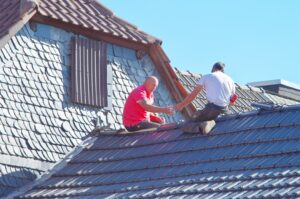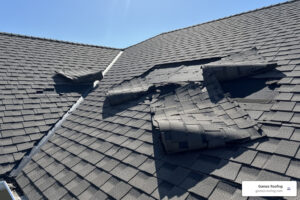Licensed roof repair: Avoid Disasters in 2025
Why Licensed Roof Repair Matters in Hurricane-Prone Florida
Licensed roof repair is critical in Florida because it ensures your contractor meets state legal requirements, carries proper insurance, and has the expertise to handle repairs that comply with Florida’s strict building codes. Here’s what you need to know:
- Legal Requirement: Florida requires roofing contractors to be licensed to operate legally.
- Insurance Protection: Licensed contractors must carry liability insurance and workers’ compensation, protecting you from liability.
- Quality Assurance: Licensing requires passing exams on building codes and proper roofing techniques.
- Consumer Protection: Only licensed contractors give you legal recourse through Florida’s Contractor Recovery Fund.
- Warranty Coverage: Manufacturer warranties are often only valid when installed by licensed professionals.
Florida’s hurricane season can turn minor roof issues into major water damage. After a storm, you need a reliable contractor, not an unlicensed “storm chaser” who offers a low-ball price and disappears, leaving you with shoddy work and potential liability. Hiring an unlicensed roofer risks voided warranties, code violations, and no legal recourse. Licensed roofers stand behind their work because they are invested in their reputation and held accountable by state regulations.
With over a decade of experience in Florida’s roofing industry, our team at Gomez Roofing has seen how proper licensed roof repair protects homeowners from costly mistakes. Understanding what licensing means—and how to verify it—is your best defense against subpar work and potential financial disaster.
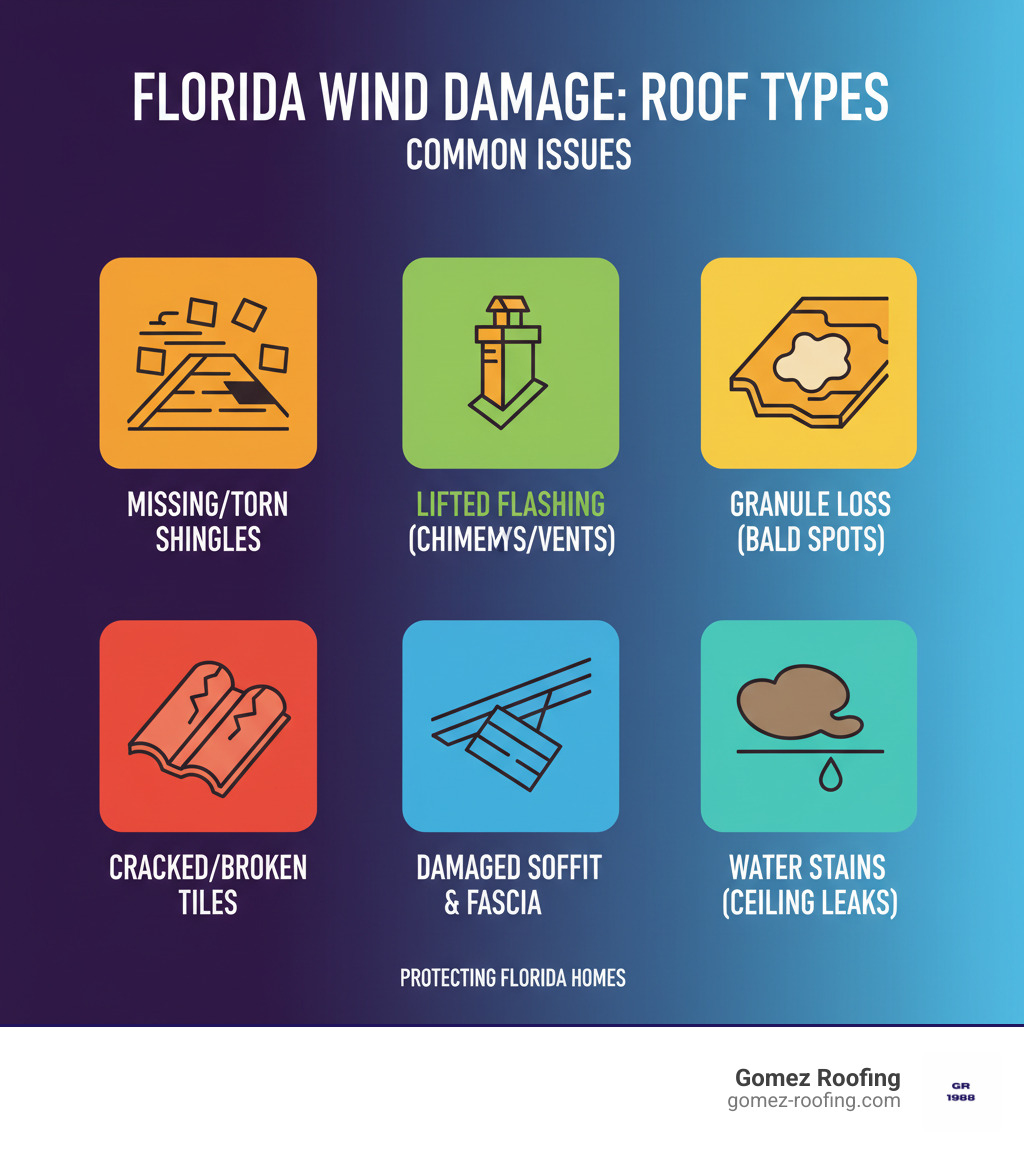
Why Licensing is Your First Line of Defense
When a storm damages your roof in South Florida, hiring a licensed roof repair contractor is your guarantee of quality, accountability, and protection. A license proves a contractor has passed state exams on Florida’s building codes and carries the necessary insurance to protect you from liability. If an uninsured worker is injured on your property, you could be responsible for their medical bills.
After major storms, be wary of “storm chasers” who flood neighborhoods in Broward, Palm Beach, and Miami-Dade Counties with low prices and quick-fix promises. These operators often lack proper licensing and insurance, performing rushed work before disappearing, leaving you with no recourse when repairs fail. A licensed contractor rooted in your community has a reputation to uphold and will stand behind their work.
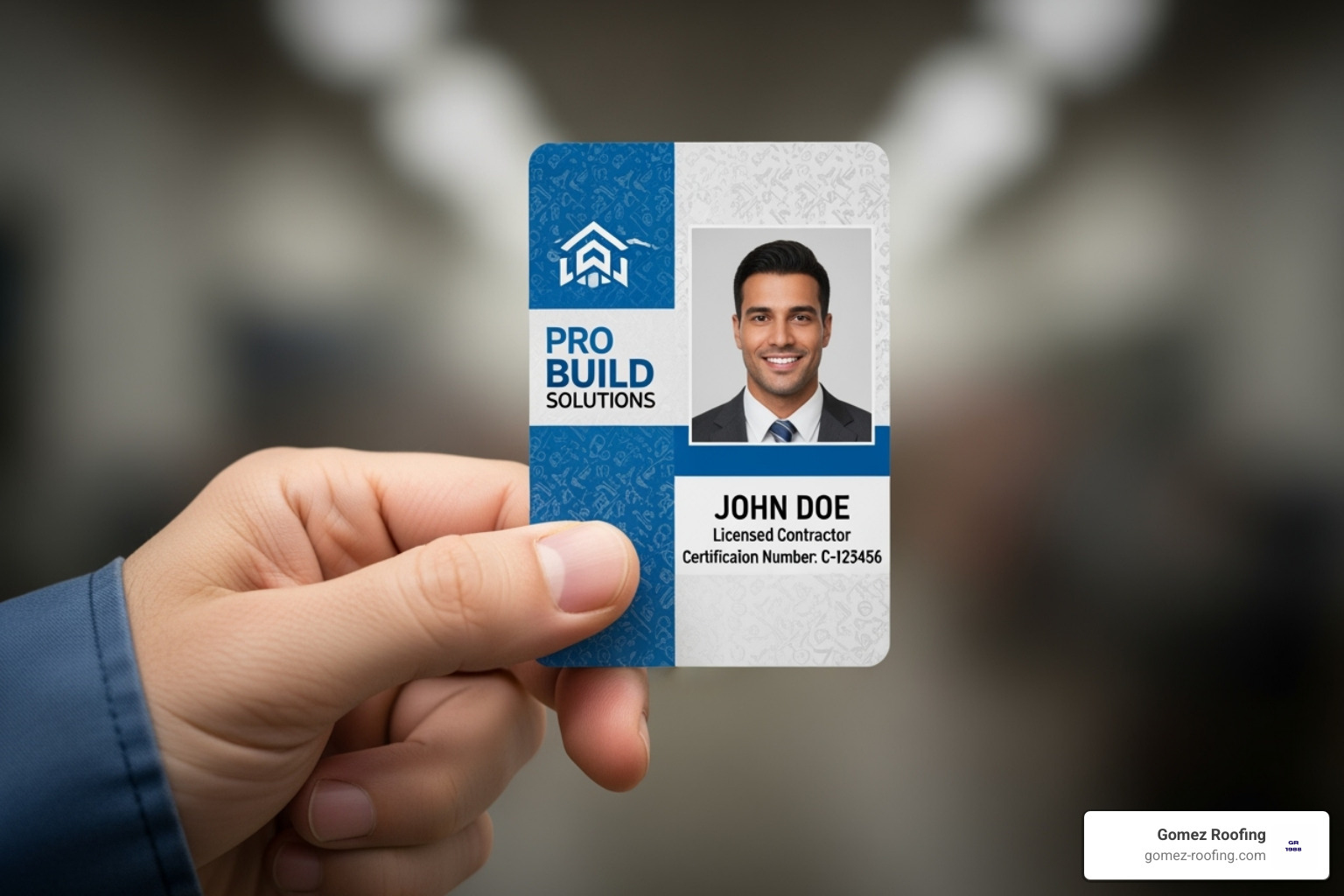
Licensed vs. Certified: What’s the Difference?
While often used interchangeably, “licensed” and “certified” have different meanings for your licensed roof repair.
-
Licensing is a legal requirement from the state of Florida. It’s a contractor’s permission to operate, proving they meet minimum standards for insurance, business practices, and knowledge of building codes.
-
Certification is a voluntary credential from material manufacturers like GAF or Owens Corning. To earn it, contractors undergo specialized training on installing specific products according to manufacturer specifications. This often gives homeowners access to superior warranties.
The best contractors are both licensed and certified, offering legal compliance and manufacturer-level expertise. Top-tier certifications to look for include GAF Master Elite®, Owens Corning Platinum Preferred, and CertainTeed SELECT ShingleMaster™. These designations are earned by only a small percentage of roofers and signify a commitment to quality, reliability, and ongoing training. You can learn More info about GAF certifications directly from their documentation.
The Dangers of Hiring an Unlicensed Roofer
That bargain quote from an unlicensed roofer can be tempting, but the risks are immense. You face:
- Shoddy Workmanship: Lack of training leads to corner-cutting, improper techniques, and premature roof failure, which voids manufacturer warranties.
- Legal & Financial Liability: If an uninsured worker is hurt on your property, you could be liable for their medical bills. If their work damages your home, you’re on the hook for repairs.
- No Recourse: When an unlicensed contractor disappears or does poor work, you have no state licensing board to appeal to for help.
- Code Violations: Unlicensed work often skips required permits and inspections, leaving your home vulnerable in future storms and creating issues when you try to sell. For guidance on handling urgent situations correctly, see our Insights on Emergency Roofing Services in Pompano Beach.
From Wind Gusts to Water Stains: The Repair Process
When wind damages your roof, the full extent of the problem isn’t always visible from the ground. That’s why every licensed roof repair project must begin with a thorough inspection. Our team examines every component, from shingles and flashing to the attic and roof deck, to check for water intrusion and structural issues.
We document our findings to help you make an informed decision: targeted repairs or a full replacement. This depends on the roof’s age, the extent of the damage, and what makes the most financial sense. Sometimes, strategic repairs can add years to your roof’s life; other times, patching an old roof is a temporary fix for a larger problem. We provide a transparent assessment so you can move forward with confidence.
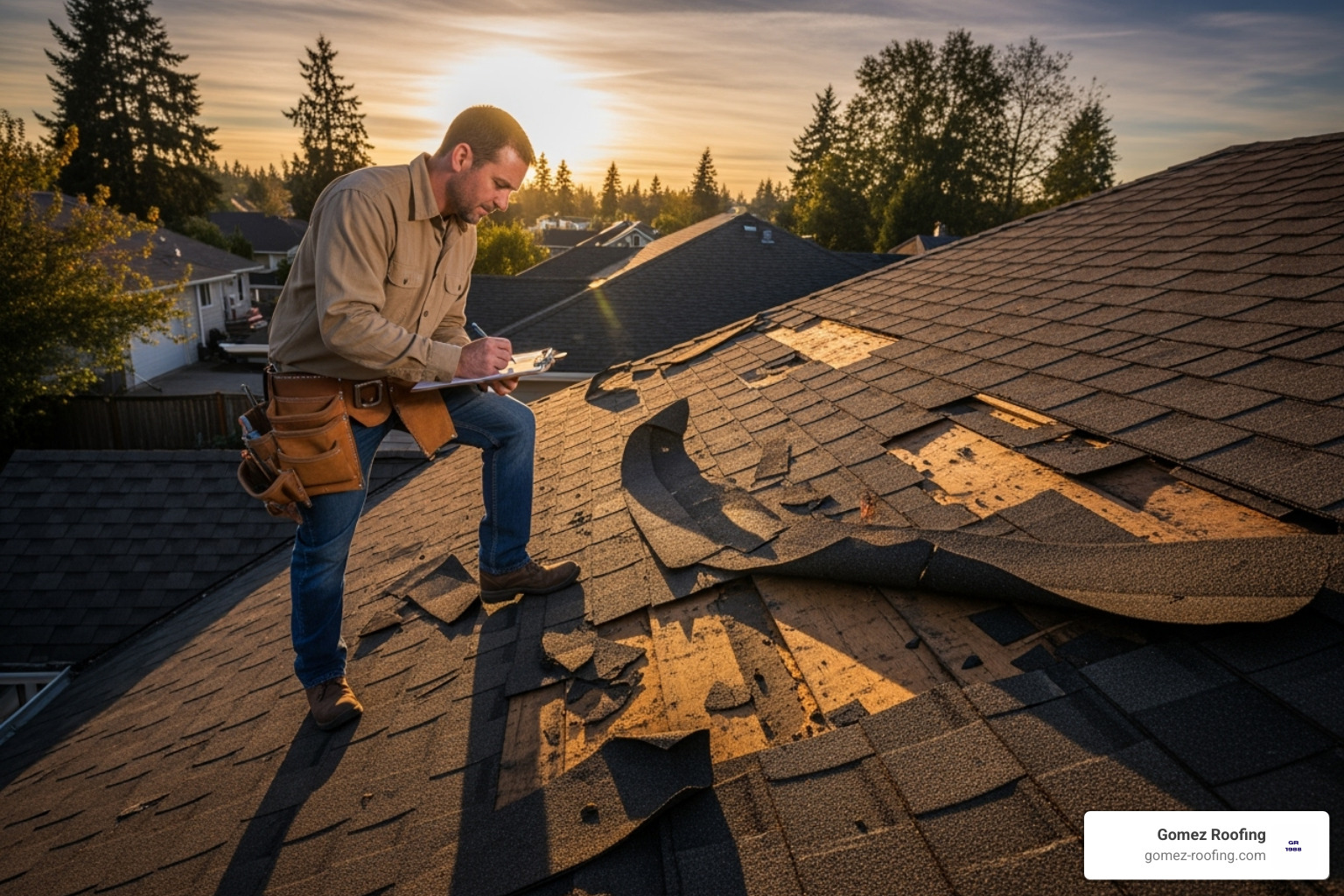
Telltale Signs Your Roof Needs Professional Attention
Catching warning signs early can save you from costly disasters. Look for these red flags:
- Missing, curling, or buckling shingles that expose the underlayment.
- Granule loss, the sand-like particles from asphalt shingles, collecting in your gutters.
- Ceiling water stains, even small ones, which indicate an active leak.
- A sagging roof deck, a serious structural issue requiring immediate attention.
- Damaged flashing around chimneys, vents, or skylights.
- Moss or algae growth, which traps moisture and accelerates deterioration.
Ignoring these signs leads to bigger problems. Prompt licensed roof repair can add years to your roof’s life. Learn more about Important Reasons to Consider Pompano Beach Roof Repairs.
Typical Services Offered by Roofing Contractors
A quality licensed roof repair contractor provides comprehensive services to protect your home. This includes emergency tarping to prevent further water intrusion after a storm, and expert leak detection and repair to fix the source of the problem. We also handle shingle and flashing replacement, full roof replacements when repairs are no longer cost-effective, and gutter and soffit work to ensure proper water management. Regular roof cleaning and maintenance is another key service that extends your roof’s lifespan by preventing debris and algae buildup. You can explore our complete range of offerings on our Services page.
Roof Repair and Replacement Timelines
Wondering how long your project will take? Here are some general timelines for licensed roof repair work:
-
Minor Repairs: Replacing a few shingles or patching a small leak typically takes one to two days, depending on accessibility and weather.
-
Full Roof Replacement: A standard residential roof replacement usually takes three to seven days. Larger homes or complex materials like tile can extend this to seven to fourteen days.
Factors like roof size and pitch, material type, weather delays, and hidden structural damage finded during tear-off can affect the timeline. We handle all necessary permitting and inspections and keep you informed every step of the way to minimize disruption.
Navigating Florida Regulations for Licensed Roof Repair
Florida has some of the toughest roofing regulations in the country, designed to ensure roofs can withstand hurricane season. The Florida Department of Business and Professional Regulation (DBPR) oversees all licensed roof repair contractors, enforcing strict standards that protect homeowners from substandard work.
Most roofing projects in Florida require a permit from your local building department. This ensures an inspector verifies the work meets Florida’s wind-resistance requirements and building codes. While it may seem like a hassle, the permitting process works in your favor by holding contractors accountable. A licensed roofer understands these regulations and manages the process for you, providing peace of mind that your roof is built to last.

How to Verify a Contractor for Licensed Roof Repair in Florida
Verifying a contractor’s credentials takes only a few minutes and can save you from major headaches. Follow these steps:
- Check the License: Use the Florida DBPR website’s online search tool to verify the contractor’s license is active and check for any disciplinary actions. A legitimate contractor will provide their license number without hesitation.
- Verify Insurance: Ask for current certificates for both General Liability and Worker’s Compensation insurance. Call the insurance companies to confirm the policies are active. This protects you from liability for accidents or property damage.
- Read Reviews: Check the contractor’s reputation on sites like the Better Business Bureau. You can Check for BBB Accredited Roofers to see customer reviews and complaint histories.
- Confirm Permits: For major work, your contractor must pull a permit. If a contractor suggests skipping this step to “save money,” it’s a major red flag.
Residential vs. Commercial Licensing Requirements
Florida has different licensing requirements for residential and commercial roofing, reflecting the different scales, materials, and building codes involved. Residential roofing contractors specialize in homes, using materials like asphalt shingles, tile, and metal. Commercial roofing involves large-scale projects like warehouses and office buildings, often using specialized materials like TPO or EPDM membranes. Commercial work typically requires higher insurance coverage and adherence to different building codes. For your home’s licensed roof repair, ensure you hire a contractor with the proper residential specialization.
What to Do About Shoddy Workmanship
If you’re unhappy with a licensed roof repair, you have recourse. Here’s what to do:
- Document Everything: Take clear photos and videos of the problem areas. Keep all contracts, invoices, and communications.
- Contact the Contractor: Give the contractor a reasonable opportunity to fix the issue. Most reputable companies stand by their work and will address problems promptly.
- File a Complaint: If the contractor is unresponsive, file a formal complaint with the Florida DBPR. The threat of disciplinary action can motivate a contractor to resolve the dispute.
- Use the Recovery Fund: Florida’s Contractor Recovery Fund may offer financial compensation to homeowners harmed by a licensed contractor’s misconduct.
- Seek Legal Advice: As a last resort, consult a construction law attorney to understand your legal options. Hiring a licensed professional gives you these avenues for resolution, which are unavailable with unlicensed workers.
The Practical Side: Costs, Materials, and Insurance
Understanding the financial aspects of licensed roof repair helps you make confident decisions. Costs can vary widely based on the scope of work, and choosing the right materials for Florida’s harsh climate is crucial. If you have storm damage, your homeowner’s insurance may cover the repairs, and knowing how to steer the claims process can reduce stress.
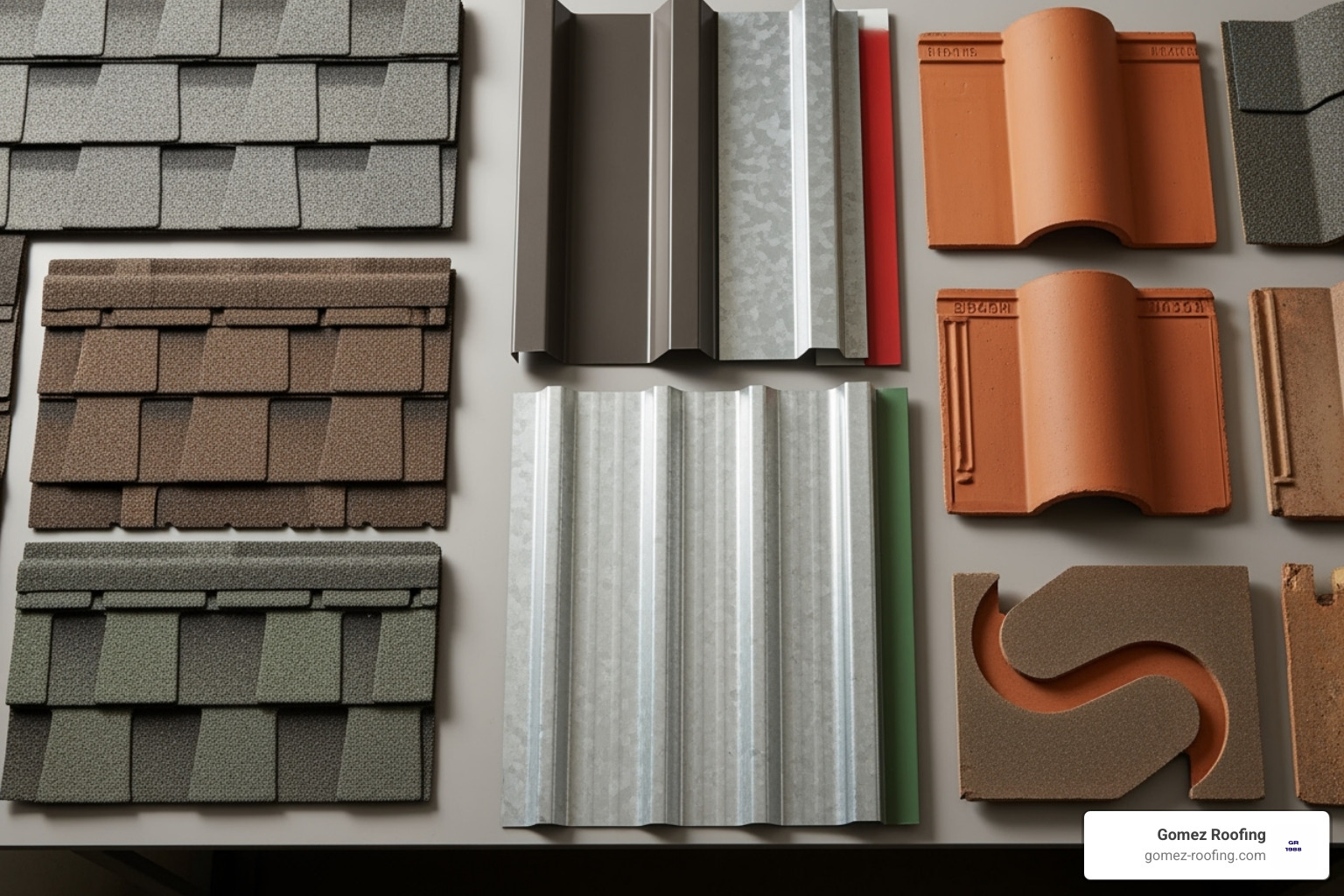
The Cost of Repair vs. Replacement
Deciding whether to repair or replace your roof depends on its age, the extent of the damage, and your budget.
- Licensed Roof Repair: Minor repairs like replacing wind-damaged shingles or fixing flashing typically cost between $380 and $1,800, with an average around $1,100.
- Full Roof Replacement: A complete replacement for a typical home usually runs between $5,890 and $12,800. Larger homes or premium materials will increase the cost.
Labor accounts for about 60% of the total bill. Other factors include roof size, pitch, material choice, and permits. If your roof is old and has widespread damage, replacement is often more cost-effective in the long run than repeated repairs. Ready for a personalized estimate? Fill out our Request Quote Form.
[TABLE] Comparing Common Roofing Materials
Choosing the right material is key to protecting your home in South Florida. Here’s a quick comparison:
| Material | Pros | Cons | Lifespan (Avg.) | Cost (Avg.) |
|---|---|---|---|---|
| Asphalt Shingles | – Most common and affordable | – Shorter lifespan in hot climates | 20-25 years | $4.00 – $8.00 per sq. ft. |
| – Wide range of colors and styles | – Susceptible to granule loss from UV and wind | |||
| – Relatively easy to install and repair | – Can become brittle in extreme heat | |||
| Metal Roofing | – Excellent durability and longevity | – Higher upfront cost | 40-70 years | $8.00 – $18.00+ per sq. ft. |
| – Highly resistant to wind, fire, and pests | – Can be noisy during rain/hail (though modern systems address this) | |||
| – Energy-efficient (reflects sun, lowers cooling costs) | – Installation requires specialized expertise | |||
| Clay & Concrete Tile | – Very durable and long-lasting | – Heavy, may require structural reinforcement | 50-100 years | $10.00 – $25.00+ per sq. ft. |
| – Excellent heat reflection, energy efficient | – Fragile and can break if walked on improperly | |||
| – Classic, aesthetic appeal (especially for Spanish/Mediterranean styles common in FL) | – Higher upfront cost and installation complexity | |||
| Slate | – Extremely durable and long-lasting (can last a century or more) | – Very expensive upfront cost | 75-200 years | $15.00 – $40.00+ per sq. ft. |
| – Luxurious, distinctive aesthetic | – Extremely heavy, often requires significant structural reinforcement | |||
| – Resistant to fire, water, and pests | – Installation is highly specialized and labor-intensive |
Asphalt shingles are the most popular and affordable choice, with quality options like GAF’s Timberline HDZ® shingles offering excellent protection. You can View GAF shingle options to see what’s available. Metal roofing offers superior longevity and energy efficiency, while clay and concrete tile provide a classic Florida look with great durability. We can help you choose the best fit for your home and budget.
Filing an Insurance Claim for Storm Damage
Navigating an insurance claim can be manageable if you follow these steps:
- Document the Damage: Immediately after a storm, take extensive photos and videos of both exterior and interior damage.
- Contact Your Insurer: Report the damage as soon as possible to get a claim number and an assigned adjuster.
- Prevent Further Damage: Take temporary measures like emergency tarping if needed. Keep receipts for potential reimbursement.
- Get Contractor Estimates: Obtain at least three detailed estimates from reputable, licensed roof repair contractors.
- Meet the Adjuster: Have your chosen contractor present during the adjuster’s inspection. They can advocate for you and ensure all damage is noted.
- Review the Settlement: Compare the adjuster’s report with your contractor’s estimate. Your contractor can help you negotiate a fair settlement that covers all necessary repairs.
We have extensive experience with insurance claims and can guide you through the process. For more tips, see our guide on How to Handle Roofing Emergencies in Pompano Beach.
Frequently Asked Questions about Florida Roof Repair
Dealing with roof issues can be overwhelming. Here are answers to common questions about licensed roof repair to help you make smart decisions.
What questions should I ask a potential roofing contractor?
Before hiring a contractor, ask these crucial questions:
- Are you licensed and insured in Florida? Ask for their license number and proof of general liability and worker’s compensation insurance. Verify this information independently.
- Do you use subcontractors? Know who will be working on your property and ensure they are also insured.
- What warranty do you offer? Understand both the manufacturer’s material warranty and the contractor’s workmanship warranty.
- Can you provide local references? Speak to recent customers in your area about their experience.
- How will you protect my property? A professional will explain their plan for protecting your landscaping and for cleanup.
- Will you obtain all necessary permits? Permitting is a legal requirement that ensures code compliance. Never skip it.
- Can I get a detailed, written estimate? A clear, itemized estimate prevents surprise costs.
How can I extend the life of my roof?
Proactive maintenance can help your roof last longer and prevent the need for premature licensed roof repair.
- Get Regular Inspections: Have a professional inspect your roof annually and after major storms to catch small issues early.
- Keep Gutters Clean: Clogged gutters cause water to back up under shingles, leading to rot and leaks.
- Trim Overhanging Branches: This prevents branches from scraping shingles or falling on your roof during a storm.
- Address Repairs Promptly: A single missing shingle can lead to major water damage if ignored. Small, quick repairs are always cheaper.
- Manage Moss and Algae: In Florida’s humid climate, algae and moss can trap moisture. Use appropriate cleaning methods to keep growth in check.
- Ensure Proper Attic Ventilation: Good airflow prevents heat and moisture buildup that can damage your roof from the inside out.
Is it better to repair or replace a roof?
The decision between licensed roof repair and a full replacement depends on several factors:
- Age of the Roof: If your asphalt shingle roof is approaching 20-25 years, replacement is often more cost-effective than repeated repairs.
- Extent of Damage: Isolated damage (a few missing shingles) is a good candidate for repair. Widespread issues (multiple leaks, sagging) point toward replacement.
- Cost-Benefit Analysis: If the cost of frequent repairs is adding up, investing in a new roof with a fresh warranty may be the smarter financial choice.
- Future Plans: A new roof is a strong selling point if you plan to move soon. If you’re staying long-term, a replacement provides decades of peace of mind.
A professional assessment is key to making the right call. We can provide an honest evaluation and detailed estimates for both options. Learn more on our page about Residential Roof Repairs and Replacements.
Your Partner for Secure and Reliable Roofing in South Florida
Throughout this guide, we’ve highlighted one critical point: protecting your home starts with hiring a properly licensed, certified, and trustworthy roofing contractor. In South Florida, where your roof faces hurricanes and intense sun, expertise and accountability are non-negotiable.
Licensed roof repair is your assurance that the work meets Florida’s stringent building codes and comes with warranties you can depend on. At Gomez Roofing, we’ve built our reputation on these principles for over a decade. We are your neighbors in Broward, Palm Beach, and Miami-Dade Counties, and we are committed to protecting your home.
We offer transparent pricing, quality materials, and the peace of mind that comes from working with a dedicated partner. Your home is your most valuable asset; its roof is the first line of defense. Don’t leave its protection to chance. Trust a licensed roofing contractor in Fort Lauderdale for your next project and let our team ensure your home is secure for years to come.


